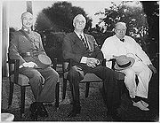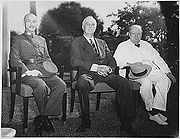
Cairo Declaration
Encyclopedia

Cairo Conference
The Cairo Conference of November 22–26, 1943, held in Cairo, Egypt, addressed the Allied position against Japan during World War II and made decisions about postwar Asia...
in Cairo
Cairo
Cairo , is the capital of Egypt and the largest city in the Arab world and Africa, and the 16th largest metropolitan area in the world. Nicknamed "The City of a Thousand Minarets" for its preponderance of Islamic architecture, Cairo has long been a centre of the region's political and cultural life...
, Egypt
Egypt
Egypt , officially the Arab Republic of Egypt, Arabic: , is a country mainly in North Africa, with the Sinai Peninsula forming a land bridge in Southwest Asia. Egypt is thus a transcontinental country, and a major power in Africa, the Mediterranean Basin, the Middle East and the Muslim world...
, on November 27, 1943. President Franklin Roosevelt of the United States
United States
The United States of America is a federal constitutional republic comprising fifty states and a federal district...
, Prime Minister Winston Churchill
Winston Churchill
Sir Winston Leonard Spencer-Churchill, was a predominantly Conservative British politician and statesman known for his leadership of the United Kingdom during the Second World War. He is widely regarded as one of the greatest wartime leaders of the century and served as Prime Minister twice...
of the United Kingdom
United Kingdom
The United Kingdom of Great Britain and Northern IrelandIn the United Kingdom and Dependencies, other languages have been officially recognised as legitimate autochthonous languages under the European Charter for Regional or Minority Languages...
, and Generalissimo Chiang Kai-shek
Chiang Kai-shek
Chiang Kai-shek was a political and military leader of 20th century China. He is known as Jiǎng Jièshí or Jiǎng Zhōngzhèng in Mandarin....
of the Republic of China
Republic of China
The Republic of China , commonly known as Taiwan , is a unitary sovereign state located in East Asia. Originally based in mainland China, the Republic of China currently governs the island of Taiwan , which forms over 99% of its current territory, as well as Penghu, Kinmen, Matsu and other minor...
were present. The Cairo Communiqué was broadcast through radio on December 1, 1943.
The Cairo Declaration is cited in Clause Eight (8) of the Potsdam Declaration
Potsdam Declaration
The Potsdam Declaration or the Proclamation Defining Terms for Japanese Surrender is a statement calling for the Surrender of Japan in World War II. On July 26, 1945, United States President Harry S...
, which is referred by the Japanese Instrument of Surrender
Japanese Instrument of Surrender
The Japanese Instrument of Surrender was the written agreement that enabled the Surrender of Japan, marking the end of World War II. It was signed by representatives from the Empire of Japan, the United States of America, the Republic of China, the United Kingdom, the Union of Soviet Socialist...
.
Summary
The main points of the document were:- The Allies resolved to bring unrelenting military pressure against Japan until it agrees to unconditional surrender.
- All territories Japan had won from ChinaChinaChinese civilization may refer to:* China for more general discussion of the country.* Chinese culture* Greater China, the transnational community of ethnic Chinese.* History of China* Sinosphere, the area historically affected by Chinese culture...
, such as ManchuriaManchuriaManchuria is a historical name given to a large geographic region in northeast Asia. Depending on the definition of its extent, Manchuria usually falls entirely within the People's Republic of China, or is sometimes divided between China and Russia. The region is commonly referred to as Northeast...
(Dongbei), FormosaFormosaFormosa or Ilha Formosa is a Portuguese historical name for Taiwan , literally meaning, "Beautiful Island". The term may also refer to:-Places:* Formosa Strait, another name for the Taiwan Strait...
(TaiwanTaiwanTaiwan , also known, especially in the past, as Formosa , is the largest island of the same-named island group of East Asia in the western Pacific Ocean and located off the southeastern coast of mainland China. The island forms over 99% of the current territory of the Republic of China following...
), and the PescadoresPescadoresThe Penghu Islands, also known as Pescadores are an archipelago off the western coast of Taiwan in the Taiwan Strait consisting of 90 small islands and islets covering an area of 141 square kilometers....
(Penghu), shall be restored to the Republic of ChinaRepublic of ChinaThe Republic of China , commonly known as Taiwan , is a unitary sovereign state located in East Asia. Originally based in mainland China, the Republic of China currently governs the island of Taiwan , which forms over 99% of its current territory, as well as Penghu, Kinmen, Matsu and other minor...
. - KoreaKoreaKorea ) is an East Asian geographic region that is currently divided into two separate sovereign states — North Korea and South Korea. Located on the Korean Peninsula, Korea is bordered by the People's Republic of China to the northwest, Russia to the northeast, and is separated from Japan to the...
shall be free and independent. - JapanJapanJapan is an island nation in East Asia. Located in the Pacific Ocean, it lies to the east of the Sea of Japan, China, North Korea, South Korea and Russia, stretching from the Sea of Okhotsk in the north to the East China Sea and Taiwan in the south...
will also be expelled from all other territories which she has taken by violence and greed.
The Declaration and Taiwanese independence
During and for many years after World War II, it was generally agreed that China acquired sovereignty over Taiwan when Japan surrendered. Thus Taiwan was sovereign territory of either the Republic of China, which actually ruled it, or of the People's Republic of ChinaPeople's Republic of China
China , officially the People's Republic of China , is the most populous country in the world, with over 1.3 billion citizens. Located in East Asia, the country covers approximately 9.6 million square kilometres...
, which claimed to be the sole legitimate government of China.
More recently, advocates of Taiwan independence
Taiwan independence
Taiwan independence is a political movement whose goals are primarily to formally establish the Republic of Taiwan by renaming or replacing the Republic of China , form a Taiwanese national identity, reject unification and One country, two systems with the People's Republic of China and a Chinese...
claimed that no valid transfer of sovereignty ever took place. The Declaration
states "that ... Formosa [Taiwan]... shall be restored to the Republic of China...", but these advocates pointed out that the Declaration is only a statement of intent, and a non-binding "press release". It is not in the official treaty archives of either the United States or Japan, so it is not deemed to be a treaty by the involved parties. Writing in the Yale Law Journal, March 1972, Lung-chu Chen and W. M. Reisman argued that the Cairo Declaration was not a legal document, and that neither it nor the Potsdam Declaration
Potsdam Declaration
The Potsdam Declaration or the Proclamation Defining Terms for Japanese Surrender is a statement calling for the Surrender of Japan in World War II. On July 26, 1945, United States President Harry S...
could make disposition of the legal title of Taiwan, or effect a transfer of that legal title to the Republic of China. Therefore, neither Japan nor the government of China have sovereignty over Taiwan, and it is a separate sovereign state.
Many scholars have traditionally rejected this claim. The standard counter-argument was that while the Cairo Declaration itself was a non-binding declaration, it was given legal effect by the Japanese Instrument of Surrender
Japanese Instrument of Surrender
The Japanese Instrument of Surrender was the written agreement that enabled the Surrender of Japan, marking the end of World War II. It was signed by representatives from the Empire of Japan, the United States of America, the Republic of China, the United Kingdom, the Union of Soviet Socialist...
. Even though the Instrument stated that Japan would implement the Potsdam Declaration, which in turn referenced the Cairo Declaration, its content only authorized the surrender of Japanese forces, not Japanese territories.
Significantly, in a 1959 court case in the United States, the US State Dept. was specifically quoted as maintaining that: " . . . that the sovereignty of Formosa has not been transferred to China . . . " and that "Formosa is not a part of China as a country, at least not as yet, and not until and unless appropriate treaties are hereafter entered into. Formosa may be said to be a territory or an area occupied and administered by the Government of the Republic of China, but is not officially recognized as being a part of the Republic of China."
See also
- Cairo ConferenceCairo ConferenceThe Cairo Conference of November 22–26, 1943, held in Cairo, Egypt, addressed the Allied position against Japan during World War II and made decisions about postwar Asia...
- Second Sino-Japanese WarSecond Sino-Japanese WarThe Second Sino-Japanese War was a military conflict fought primarily between the Republic of China and the Empire of Japan. From 1937 to 1941, China fought Japan with some economic help from Germany , the Soviet Union and the United States...
(1937–1945) - Potsdam DeclarationPotsdam DeclarationThe Potsdam Declaration or the Proclamation Defining Terms for Japanese Surrender is a statement calling for the Surrender of Japan in World War II. On July 26, 1945, United States President Harry S...
(July 1945) - General Order No. 1 (Aug. 1945)
- Japanese Instrument of SurrenderJapanese Instrument of SurrenderThe Japanese Instrument of Surrender was the written agreement that enabled the Surrender of Japan, marking the end of World War II. It was signed by representatives from the Empire of Japan, the United States of America, the Republic of China, the United Kingdom, the Union of Soviet Socialist...
(Sep. 1945) - Treaty of San FranciscoTreaty of San FranciscoThe Treaty of Peace with Japan , between Japan and part of the Allied Powers, was officially signed by 48 nations on September 8, 1951, at the War Memorial Opera House in San Francisco, California...
(1951) - Treaty of TaipeiTreaty of TaipeiThe Sino-Japanese Peace Treaty , commonly known as the Treaty of Taipei , was a peace treaty between Japan and the Republic of China signed in Taipei, Taiwan on April 28, 1952...
(1952)

